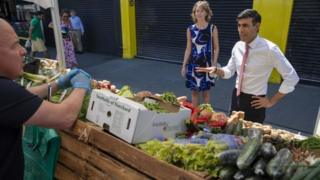Can Rishi Sunak save your job? Five things he may do
 Image copyright PA Media
Image copyright PA Media Strawberries and cream, maybe even a glass of rosé: the «summer update» has a whiff of end-of term festivities. But the Chancellor’s summer statement on Wednesday may impact millions of livelihoods – and his own reputation.
The grants, subsidies and loans deployed to shield the British economy from the shock of lockdown didn’t manage to preserve all jobs. However, they ensured that lay-offs in the first couple of months of lockdown were in the thousands, rather than millions.
The real test for Rishi Sunak starts now. As one of his predecessors remarked, everyone loves the Chancellor when he’s splashing the cash, and those schemes have cost tens of billions – in total he’s staring at a £300bn deficit this year.
With the furlough scheme set to be wound down, it’s clear crippling job losses in some sectors are under way.
This emergency mini-Budget on Wednesday will attempt to help minimise the pain as the economy convalesces by «flattening the curve» – this time of job losses – and to prevent the kind of lingering mass joblessness last seen when the Chancellor was a toddler, that risks blighting millions of lives.
Here are five areas to bear in mind – we already know some of what he’ll look at, but there’s more to come:
1. Money for training
At present, some economists say unemployment could triple to over four million this year. Rishi Sunak is expected to detail the beefing up of job centres, with more work coaches and advisers – underscoring that the government too is getting ready for an onslaught of losses.
The rise in joblessness won’t be fleeting; the first advisers won’t be in place until October. There’s more money for careers advice too, and work placements.
Learning new skills will be vital – particularly for the youngest workers and lowest paid who’ve been particularly badly hit.
2. Saving jobs
Rishi Sunak has talked of preserving jobs where possible, and that may mean taking different approaches with different industries.
A skilled workforce isn’t enough; you need the demand for their talents – in other words, flourishing businesses. And some of those are suffering simply because they’ve not been able to open yet.
The struggling arts and heritage sector has been promised a £1.6bn bespoke package of loans and grants.
That’s a shift away from the Treasury’s previous reluctance to provide tailored help – and may raise hopes elsewhere. But will those industries which don’t have the glamour of showbiz, with high profile spokespeople, be as lucky?
3. Boosting new sectors
The package for the arts sector may signal that the Chancellor remains reluctant to extend the furlough scheme, even for struggling sectors. Some sectors – travel for example – may fail to ever fully recover in the absence of a vaccine.
Rather than prop them up, some argue it would be better to divert resources to supporting growing industries. Rishi Sunak is expected to earmark some cash to support green jobs and to promote environmentally friendly home improvements. Incentives for other «new» industries may also feature.
4. Tax cuts?
Even the future of businesses who have reopened may not be secure, unless customers feel safe coming back, not just physically, but financially.
Rishi Sunak has stopped short of a haircut photo opportunity, but he’s set the tone with visits to shops, markets and even the pub, despite being teetotal.
And now he may be after our bank accounts. A record amount of money was stashed away in May as the majority of the population saw their incomes untroubled, but their spending reduced.
An emergency short-term VAT cut of say, 2% or 3%, targeted at perhaps the hospitality industry may tempt us to part with some cash.
A similar cut was tried during the financial crisis but its impact was limited. Other ideas that have been touted include state-issued vouchers to spend on holidays, or changes to National Insurance contributions. All would bear a cost of billions.
5. The Budget will remain the main event
The next annual Budget is due in the autumn, which gives the Chancellor time to mull over how the economy is progressing and introduce more measures, alongside the usual forecasts.
We may, however, not have to wait that long for rumoured temporary changes to stamp duty. Some now expect that measure, which would boost the fortunes of homebuyers and housebuilders, to come up this Wednesday.
At that Budget, we may hear more about how he’ll pay for all this. At present, the government is able to borrow cheaply via bonds on the financial markets, but there are limits. Mr Sunak may have to find other ways of footing the tab, such as pausing the «triple lock» formula used to calculate pension rises, for example. That won’t be popular.
Five months into the job, Mr Sunak is enjoying popularity ratings far in excess of that of his Cabinet colleagues, thanks to his handling of the economic crisis so far.
Hanging on to that pole position over the challenging months – or even years – ahead will be no picnic.



